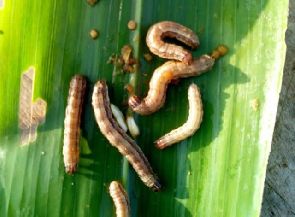
Ghana is estimated to have lost about US$64 million through the fall armyworm infestation.
The pests, detected in the country some 15 months ago, have since attacked more than 20,000 hectares of farms, nationwide.
Research scientists attached to the Biotechnology Research Programme (BRP) of the Crop Research Institute (CRI), have prescribed a solution – to end the havoc the armyworms have been wreaking on farms.
They are urging the development and use of genetically-modified (GM) maize to stop the destruction the pests are causing.
Professor Mrs. Marian Quain, Leader of the BRP, said studies had shown that genetically-modified maize with in-built disease-resistant genes had the potential to withstand the harmful effects of the pests.
Addressing a seminar jointly organized by the CRI and National Bio-safety Authority (NBA) at Fumesua in the Ejisu Municipality, she noted that the conventional agricultural system had become fraught with varied challenges.
This had been due to the changing climatic conditions, overpopulation, excessive use of pesticides and insecticides.
Prof Mrs. Quain asked that the nation facilitated the processes for the acceptance of GM-related technology in plant breeding and crop production to enhance food security, given the emerging threats to agricultural productivity.
The programme brought together agricultural researchers, extension officers, plant breeders, seed growers, environmentalists, health experts and the media.
GNA




